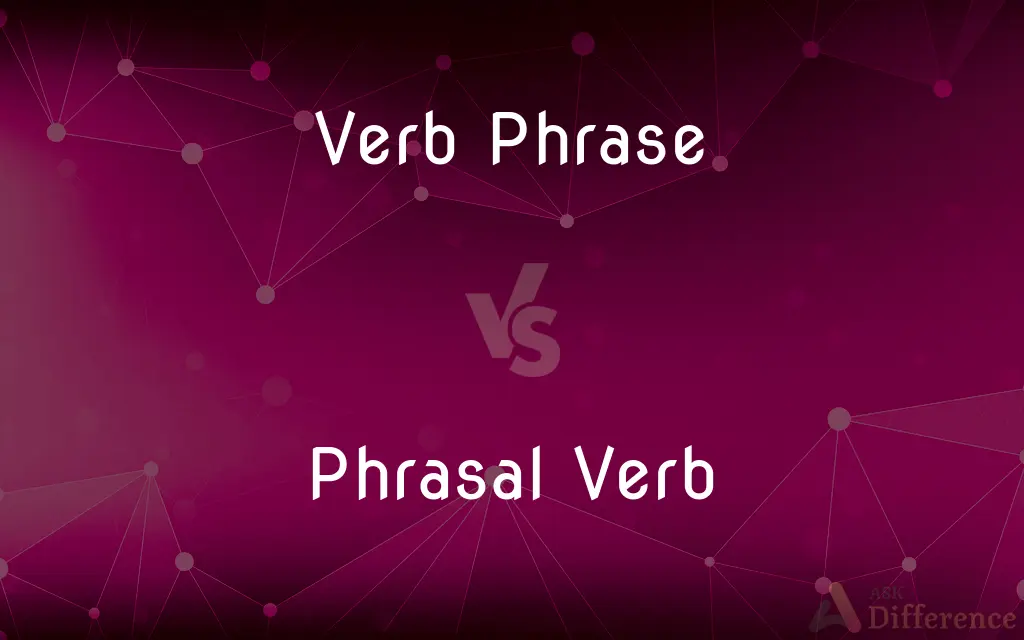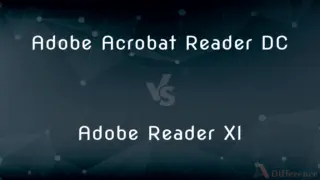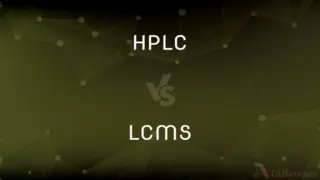Verb Phrase vs. Phrasal Verb — What's the Difference?
By Tayyaba Rehman & Urooj Arif — Published on February 17, 2024
A verb phrase consists of a main verb along with its auxiliaries (helpers), expressing a complete action or state. A phrasal verb is a combination of a verb and a preposition or adverb that together create a meaning different from the original verb.

Difference Between Verb Phrase and Phrasal Verb
Table of Contents
ADVERTISEMENT
Key Differences
Verb phrases and phrasal verbs are two important concepts in English grammar, each playing a unique role in sentence structure and meaning. A verb phrase extends the idea of a verb through the inclusion of auxiliary verbs, giving additional information about time, mode, aspect, or voice. For instance, "is writing," "has been completed," and "will be considered" are all examples of verb phrases where the main verb is supported by one or more auxiliary verbs to clarify the action's nature or the state being described.
Phrasal verbs, on the other hand, are idiomatic expressions formed by a verb and an adverb or preposition. The resulting combination often bears a meaning that cannot be deduced from the individual components alone. Examples include "break down" (to stop functioning), "put off" (to postpone), and "get away with" (to escape blame or punishment). Phrasal verbs are particularly challenging for learners of English due to their idiomatic meanings.
While verb phrases can be dissected into their constituent parts with each part retaining its original meaning, phrasal verbs lose their literal meaning when separated. The preposition or adverb in a phrasal verb drastically changes the verb's meaning, which is not the case with auxiliary verbs in verb phrases that serve to modify the main verb's tense, aspect, mood, or voice without altering its inherent meaning.
Understanding the difference between these two is crucial for mastering English grammar and syntax. Verb phrases form the backbone of English sentence structure, providing detailed information about actions and states. Phrasal verbs enrich the language by allowing for the expression of complex ideas through simple verb-preposition or verb-adverb combinations.
In essence, while verb phrases expand upon the information provided by the main verb, phrasal verbs offer a unique way to convey specific actions or states through combinations of verbs with prepositions or adverbs, each with a distinct meaning not immediately apparent from the verb itself.
ADVERTISEMENT
Comparison Chart
Components
Main verb + auxiliary verbs
Verb + preposition/adverb
Function
To express actions/states with detail on tense, aspect, mood
To create idiomatic expressions with unique meanings
Meaning
Derived from the main verb, modified by auxiliaries
Not deducible from the individual components
Examples
"has been running," "will be going"
"look up" (to search), "give away" (to distribute freely)
Usage
Fundamental for sentence construction and conveying detailed actions
Useful for expressing specific ideas or actions idiomatically
Compare with Definitions
Verb Phrase
A verb phrase consists of a main verb and its helpers.
She has been reading for hours.
Phrasal Verb
Often idiomatic in nature.
He finally gave in to the demands.
Verb Phrase
Forms the predicate of a sentence.
He must finish his homework.
Phrasal Verb
Can be separable or inseparable.
I ran into an old friend at the store.
Verb Phrase
Expresses complete action or state.
The project will be completed soon.
Phrasal Verb
Creates a meaning different from the original verb.
They put off the meeting until next week.
Verb Phrase
Includes auxiliary verbs for detail.
We have been waiting for you.
Phrasal Verb
A phrasal verb combines a verb with a preposition or adverb.
Please look up the word in the dictionary.
Verb Phrase
Can modify tense, aspect, and mood.
They are going to the market.
Phrasal Verb
Challenges learners with unique meanings.
She's always looked down on me.
Common Curiosities
What is a verb phrase?
A combination of a main verb and auxiliary verbs that express a complete action or state.
How do you identify a phrasal verb?
Look for a verb followed by a preposition or adverb that together imply a meaning different from the verb alone.
Can a sentence contain both a verb phrase and a phrasal verb?
Yes, a sentence can include both, depending on its structure and meaning.
Why are phrasal verbs challenging to learn?
Because their meanings often cannot be inferred from the individual words.
Are all verb phrases long?
No, verb phrases can be short, depending on the number of auxiliary verbs used.
Are phrasal verbs formal or informal?
They tend to be more informal and are commonly used in spoken English.
Do phrasal verbs always include a preposition?
They can include either a preposition or an adverb, or sometimes both.
Do verb phrases only express actions?
They can express actions, states, or conditions, depending on the main verb.
Can the same words form different phrasal verbs?
Yes, depending on the context and combination, the same words can create different meanings.
Can the components of a phrasal verb be separated?
Some phrasal verbs are separable, meaning the object can come between the verb and the preposition/adverb.
What is a phrasal verb?
An idiomatic expression formed by a verb and a preposition or adverb, with a unique meaning.
Can the meaning of a verb phrase change based on its components?
The basic meaning of the main verb is modified by auxiliaries regarding tense or aspect but not fundamentally changed.
How important are phrasal verbs in English communication?
Very important, especially in conversational English, as they convey specific actions or states succinctly.
How can I master phrasal verbs?
Practice and exposure to context can help understand and remember the unique meanings of phrasal verbs.
How do auxiliary verbs affect a verb phrase?
They modify the main verb’s tense, aspect, voice, or mood without changing the basic action or state described.
Share Your Discovery

Previous Comparison
Adobe Acrobat Reader DC vs. Adobe Reader XI
Next Comparison
HPLC vs. LCMSAuthor Spotlight
Written by
Tayyaba RehmanTayyaba Rehman is a distinguished writer, currently serving as a primary contributor to askdifference.com. As a researcher in semantics and etymology, Tayyaba's passion for the complexity of languages and their distinctions has found a perfect home on the platform. Tayyaba delves into the intricacies of language, distinguishing between commonly confused words and phrases, thereby providing clarity for readers worldwide.
Co-written by
Urooj ArifUrooj is a skilled content writer at Ask Difference, known for her exceptional ability to simplify complex topics into engaging and informative content. With a passion for research and a flair for clear, concise writing, she consistently delivers articles that resonate with our diverse audience.
















































